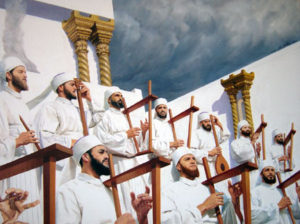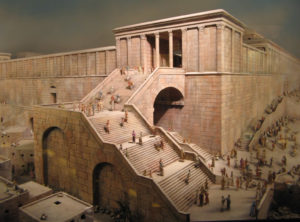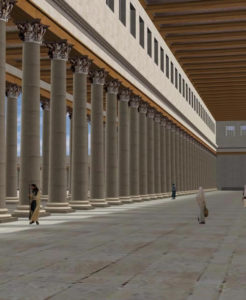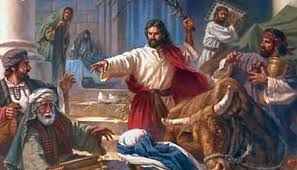Jesus Entered the Temple Area and Drove Out
All Who Were Buying and Selling
Matthew 21:12-17; Mark 11:15-19; Luke 19:45-48
Monday the Eleventh of Nisan
Jesus entered the Temple area and drove out all who were buying and selling. DIG: What angered Yeshua so much about what He saw in the Temple? Although the Sadducees once performed a useful role for out-of-town pilgrims, how had it become a stumbling block to worship for the Jewish people? To the Gentile ministry? How is the cursing of the fig tree (to see link click Iu – Jesus Curses a Fig Tree) an acted-out parable about what happened in the Temple and what was to come (Hosea 9:10-17)? What was the Chief Shepherd threatening when He said the Sadducees were making the Temple out to be a den of robbers?
REFLECT: If Jesus were to visit your messianic synagogue or church, where might He begin turning over tables? How would you describe your own response to injustice, abuse, or moral corruption? What does it take to motivate you enough to take action? Where is ADONAI calling you to get involved?

Singing at the Temple: The Temple choir was singing on the fifteen semicircular steps led from the Court of the Women, through the Nicanor Gate and into the Court of Isra’el. During the great feasts these magnificent steps served as a podium for the choir and the orchestra. From the Talmud Tractate tamid we know exactly which Psalm would have been sung on which day of the week in connection with the daily burnt offering in the Temple. It is amazing how closely each of the Psalms coincides with the singing of these daily readings. It’s amazing how the daily psalms agreed with Christ’s daily events during Holy Week. Therefore, as Jesus entered the Temple Mount the Levitical choir, with instrumental accompaniment from the Temple orchestra, sang Psalm 48. This psalm praised God’s royal and judicial authority:
Great is ADONAI and greatly to be praised, in the City of our God, His holy mountain, beautiful in its elevation, the joy of all the earth, Mount Tziyon, in the far north, the City of the great King. In its citadels God has been revealed as a strong defense. For the kings met by agreement; together they advanced. They saw and were filled with compassion; terrified, they took to flight. Trembling took hold of them, pains like those of a woman in labor, as when the wind out of the east wrecks the “Tarshish” ships. We heard it, and now we see for ourselves in the City of ADONAI, the Lord of heaven’s armies, in the City of our God. May God establish it forever. God, within Your Temple we meditate on your grace. God, Your praise, like Your name, extends to the ends of the earth. Your right hand is filled with righteousness. Let Mount Zion rejoice, let the daughters of Judah be glad, because of your judgment [on our enemy]. Walk through Zion, go all around it; count how many towers it has. Note its ramparts, pass through its citadels, so that You can tell generations to come that such is God, our God forever; He will guide us eternally (Ps 48:1-14).1257
It was Monday the eleventh of Nisan (to see link click Ix – The Examination of the Lamb) and as the Lord and His apostles entered Jerusalem they went directly into the center of God’s spiritual universe – the Temple Mount. This was a bustling hub of activity, not only for the tens of thousands of Jews who lived in the vicinity, but also for the hundreds of thousands of Jews who would travel long distances to the Holy City of Zion – from Galilee, Syria, Egypt and even Rome – to celebrate the climax to the Jewish year. It was a requirement for all able-bodied Jewish men not only to come to the Temple for the three main pilgrim festivals of Pesach, Shavu’ot, and Sukkot (see my commentary on Exodus Eh – Three Times a Year You Are to Celebrate a Festival to Me), but to bring their tithe from their labors. When all was said and done, about a million worshipers would travel to Yerushalayim to celebrate the Passover.
So, just as He had done every spring since childhood, Jesus of Nazareth made the journey to Tziyon. When He arrived, our great Rabbi was ending His public ministry during the third Passover in the City of David where it began on the first Passover. Christ started His public ministry with the first cleansing of the Temple (see Bs – Jesus’ First Cleansing of the Temple at the Passover), but that had been three years ago. There was no miracle the first time He cleansed the Temple and there would be no miracle this time.
But things were different now. The stakes were higher. Jesus of Nazareth was famous. People followed Him wherever He went. His every move was scrutinized, the Pharisees and the Sadducees waited for Him to make a critical mistake that would allow them to turn public opinion against Him. Human reasoning would dictate that He should avoid controversy, and let the status quo hum along smoothly as during every other Passover. A jarring public display of temper could sour the tsunami of popularity He was riding. But Yeshua really wasn’t there to win a popularity contest. He was there to do His Father’s business.

Yeshua evidently marched straight into the broad open-air plaza of the Royal Stoa. The direct way for the Lord to enter ran via the majestic stairway on the Southwest corner of the Temple as King over His house. Today it is known as Robinson’s Arch, named after the biblical scholar Edward Robinson who identified its remnants in 1938. It carried traffic up from ancient Jerusalem’s Lower Market area and over the Tyropoeon Street into the Royal Stoa. It is generally known as the most massive stone archway in antiquity.1258

When Jesus entered the inside of the Royal Stoa, He could smell the animals and hear the money changers at their tables. It was built according to the plan of a basilica, or a large structure in ancient Rome. Rectangular in design, it consisted of a roofed hall entered from porticos at the ends. The hall consisted of a nave and was separated from the two side aisles by rows of columns. The nave walls rose above the aisle roofs and were constructed with windows to admit light. It was actually an extension of the Court of the Gentiles; therefore, it was a public place that could be used for debate or business. The rabbinic description for it was called chanuth or chanuyoth in the Talmud, which means something like shop, market or shopping arcade.1259

There was a flurry of activity that day inside of the Royal Stoa. There were sacrificial bulls, goats, sheep and doves to be bought, pagan money to be exchanged for Jewish half-shekels, and other ritually pure items like wine, oil, and salt to be acquired for Passover. Long lines of pilgrims waited for their chance to exchange their meager earnings for the coins minted by the wealthy Sadducees who were in charge of the Temple. Infuriated, the Rabbi from Galilee began driving out those who were buying and selling there. Without warning, He overturned the tables of the moneychangers and the benches of those selling doves sending a small fortune in coins flying in every direction (Mt 21:12; Mk 11:15; Lk 19:45). Before the Sadducees could say anything, Jesus was already at the next table, and then on to the next. He moved from the money changers tables to where the sheep were being sold. There the tables and money were flying and livestock ran loose across the broad open-air Stoa. Making no attempt to pick up the coins, the Sadducees saw their profits littering the ground. Nobody had ever seen anything like it.
Messiah was angry but not out of control. His actions were methodical and His every movement demonstrated that He feared no one, let alone the Great Sanhedrin itself. The moneychangers and the sellers of doves were irate. They must have stood there with their fists clenched staring at Him. Yet they didn’t try to stop Him.
Today there are those who assume that the conducting of any kind of business in the Temple Mount was prohibited. But nothing could be further from the truth. The Torah even mandated that the needs of the pilgrims coming for the festivals needed to be met so they could worship properly. At that time it could be quite a hardship if you were traveling from abroad with several wagons full of produce. However, the Torah provided a logical adaptation: If the distance is too great for you, so that you are unable to transport [your tithe], because the place where ADONAI chooses to put His name is too far away from you; then, when ADONAI your God prospers you, you are to convert it into money, then take the money with you, go to the place where ADONAI your God will choose and exchange the money for anything you want . . . (Deuteronomy 14:24-26).
But merely exchanging money was not the problem because they were merely following the commandment above and provided an important service for the traveling worshipers. Greek or Roman money (bearing idols) that they brought with them had to be changed into Temple currency, or Jewish half-shekels, so they could pay the Temple tax. Therefore, the moneychangers service was necessary to convert pagan money into Jewish currency (Tractate Berakhot 8:7).
And Jesus would not allow anyone to carry merchandise through Royal Stoa (Mark 11:16). By this action He claimed to have greater authority over the Temple than that of the high priest himself (Hosea 9:15). He was, and is, Lord of the Temple. Here we see Him exercise His authority in three ways: He cleanses, possesses and safeguards the Temple.
However, something was dreadfully wrong in Royal Stoa that day as Messiah confronted the Sadducees. And as He taught them, He said: Is it not written: “My house will be called a house of prayer for all nations?” The Royal Stoa was a part of the Court of the Gentiles, which was merely the area of the Temple Mount that was accessible to Gentiles and it had been expanded to provide as many Gentiles as possible the opportunity to worship the one true God. Caiaphas had authorized the use of the Royal Stoa for the sale of ritually pure items (oil, wine, salt and approved sacrificial animals). This commercial system was set up right in the area of the Temple that had been designated for devout Gentiles to pray and was hindering Israel’s witness to the surrounding Gentile world. God had told Abraham: All the Gentile nations on the earth would be blessed through him (Genesis 18:18). This verse could actually be translated: My house will be called a house of prayer for all the Goyim, or all the Gentiles (see my commentary on Isaiah Jj – My House Will Be Called a House of Prayer for All Nations). Thus, by allowing the Royal Stoa to become a noisy, smelly public market, the Sadducees were preventing Gentiles from exercising their spiritual privilege promised them.1260
But it was not only the lacking of reverence and the stumbling of the Gentiles that caused our Lord to intervene in the Temple, but also the insatiable ballooning of prices. The sacrificial animals were obviously being sold at over inflated prices. All Jews twenty years of age and up were required to pay the annual half-shekel Temple tax (Exodus 30:12-16). But they had to exchange their Greek or Roman currency (which featured human portraits, which were considered to be idolatrous) for Jewish coinage. The half-shekel was not always used in everyday commerce, but was the only coin accepted by Annas (the high priest as far as the Jews were concerned). Although a small surcharge was permitted, the sons of Annas were guilty of extortion and fraud. While the Lord, at the first cleansing of the Temple, only warned to stop turning my Father’s house into a market, but this time He went further in His accusation, saying: You have made it “a den of robbers” (Matthew 21:13; Mark 11:17; Luke 19:46 and see my commentary on Jeremiah Cb – The Temple Sermon). Consequently, the intervention of the Son of God was urgently required.1261
Now that was a problem and the heart of the issue. The sons of Annas were gouging the pilgrims and overcharging them for the required sacrifices and kosher items for the Passover meal. If a priest should inspect a worshiper’s lamb and found even a single blemish, the sacrifice was deemed unclean and the peasant would be forced to buy a lamb from the wealthy Sadducees. This problem is confirmed by the Talmud where a rebuke is issued to Annas and his sons who corrupted the Temple and the Sanhedrin with similar injustices (Tractate Pesachim 57a).1262 It is no wonder that the people quietly seethed when doing business with the sons of Annas.
The Temple guard was tense. They knew that arresting Jesus at that time would be completely justifiable because He had interfered with the flow of commerce and called the Temple His home – as if He were God. But a quick scan of the crowd showed that it would not be a wise thing to do. The people weren’t afraid of the Lord; they were empowered by Him. Yeshua just did something they’d wanted to do every time they stood in that long line to change their money into Temple currency, watching the corrupt sons of Annas siphon off a big chunk of their hard earned money.1263
This corruption of the Temple represented what had happened to the nation as a whole. Judgment and cleansing would come upon the nation in AD 70, just as it had come upon the Temple during the life of Christ.
It was no coincidence that Messiah entered the Holy Temple the day before on Sunday, the tenth of Nisan. It was the very day of choosing and inspecting a lamb for each home to celebrate the upcoming Seder on Friday, the fifteenth of Nisan (see Ix – The Examination of the Lamb). In those final days of preparation, every home would be meticulously cleaned and koshered for the holy day. In the case of the Passover, this requires the removal of all leaven from observant homes. In a spiritual sense, the removal of leaven is a picture of removing sin from our presence as well. How appropriate and prophetic that Yeshua would enter the house of God on that all-important date! Everything, especially the Holy Temple, needed to be made kosher for the Passover.1264
Fearful of the renegade Rabbi, but unable to resist Him, the Jewish religious leaders, moneychangers, sacrifice-buyers and pilgrims using the Court of the Gentiles as a shortcut through Tziyon apparently all melted away. But the blind and the lame, though surely in awe of Yeshua, were not afraid of Him. Even after His dramatic display of divine indignation, those needy souls instinctively knew that the Lord’s fury was not directed at them. Just as the wicked and unrepentant can expect God’s anger, those who humbly seek His truth and His grace can expect His care. Christ’s compassion was a supreme credential of His divine kingship, not only because of the power it demonstrated but because of the gracious love it demonstrated that is so characteristic of ADONAI, but so uncharacteristic of fallen mankind. So when they approached Him, He healed them (Mattityahu 21:14).1265
Even the little children were praising Jesus. But when the Pharisees and the Torah-teachers saw the wonderful things He did and the children shouting in the Temple courts, “Hosanna to the Son of David.” And then another child called out the same thing, and then another, and another. The Sadducees as always, were watching. They were indignant because the children were quoting from the Hallel, a clear messianic reference: Please, ADONAI! Save us! Please, ADONAI! Rescue us! Blessed is He who comes in the name of ADONAI. We bless you from the house of ADONAI (Psalm 118:25-26).
Then the Jewish religious leaders confronted Yeshua about the tumultuous scene. Indignantly they asked: Do you hear what these children are saying? Of course, replied Jesus. Not only did He understand what was proclaimed, but He also affirmed it as part of the prophetic picture of the coming ha-Meshiach. Then paraphrasing Psalm 8:2, He replied: Have you never read, “From the lips of children and infants you, Lord, have called forth your praise” (Matthew 21:15-16)? The Pharisees and Sadducees knew that Psalm well. It was a call for ADONAI to delight in the praise of children, then to establish a stronghold against His enemies. Then the Sadducees realized what Jesus was really saying. He was actually comparing them to the enemies of God!
Every day He was teaching in the Royal Stoa. But the Sanhedrin leaders heard this and began looking for a way to kill him. This is the first time in the synoptic gospels that the Sadducees and the Torah-teachers both conspired to kill Jesus. Yet, while the apostate religious authorities objected they could not find any way to do it, because all the people hung on His words (Mark 11:18: Luke 19:47-48; John 10:23). It seems a rather consistent theme that the messiahship of Yeshua was questioned and rejected by the religious establishment, yet affirmed by those who (like children) took an honest and simple look at Him. Such is often the case to this day.1266
As the first cooking fires were being lit on the Mount of Olives, Jesus and His talmidim left and went out of the City of David and walked back to Bethany where they spent the night at the home of Mary, Martha and Lazarus (Matthew 21:17; Mark 11:19). It had been a most eventful day as the sun set.
A sacrifice pleasing to ADONAI is one that comes from a broken and contrite heart (Psalm 51:17). God does not want sacrifices where there is no true conversion of the heart. To Him these are empty. Rather, He wants people who keep justice, and do righteousness, who keep Shabbat, not profane it. He seeks those who choose things that please Him and who hold fast to the covenant (Isaiah 56:1-2 and 4; Jeremiah 7:1-15).
We are given the opportunity everyday to offer worship pleasing to God. When we choose to do what we know He desires rather than what is self-serving, we are offering pleasing sacrifices. Whenever we choose faith over doubt we please Him. Each day we need to accept the truths we read in the Scriptures about how we should live our lives. We need to be yielded to the Ruach Ha’Kodesh and allow the temple of our bodies to become houses of prayer and we will offer sacrifices pleasing to the Lord.
Holy Spirit, source of all wisdom and knowledge, reveal the truth of Yeshua to us. Help us to have a heart that loves the Father and wants to offer Him thanks and praise as a pleasing sacrifice. Selah, He is worthy.1267



Leave A Comment